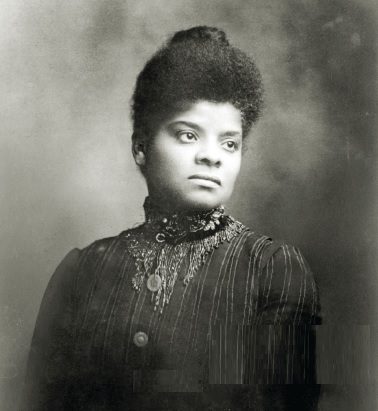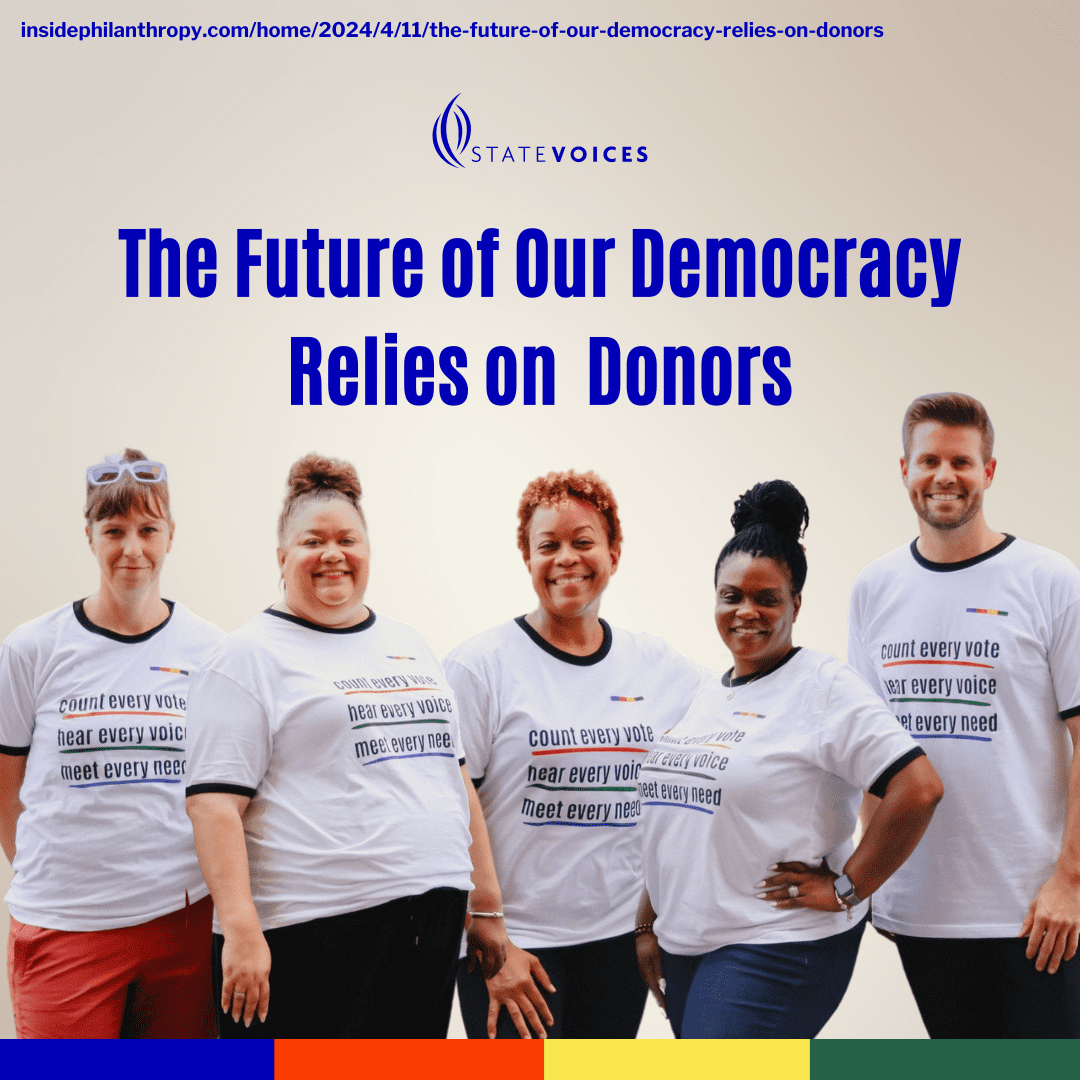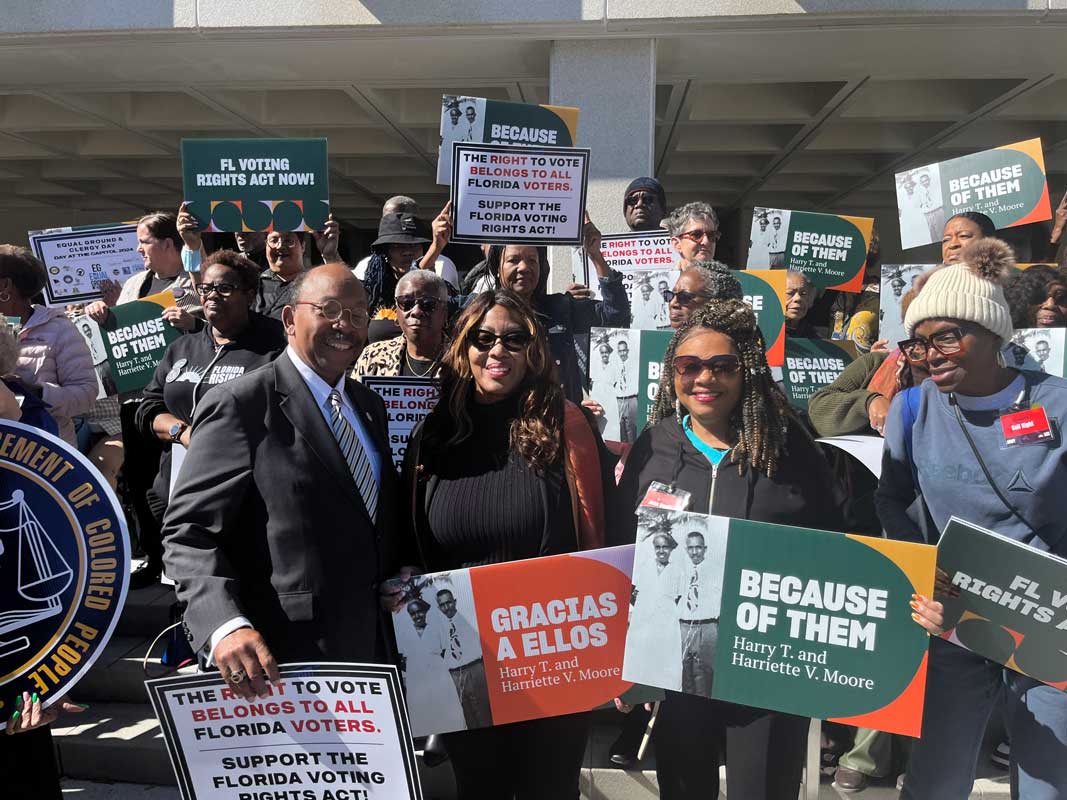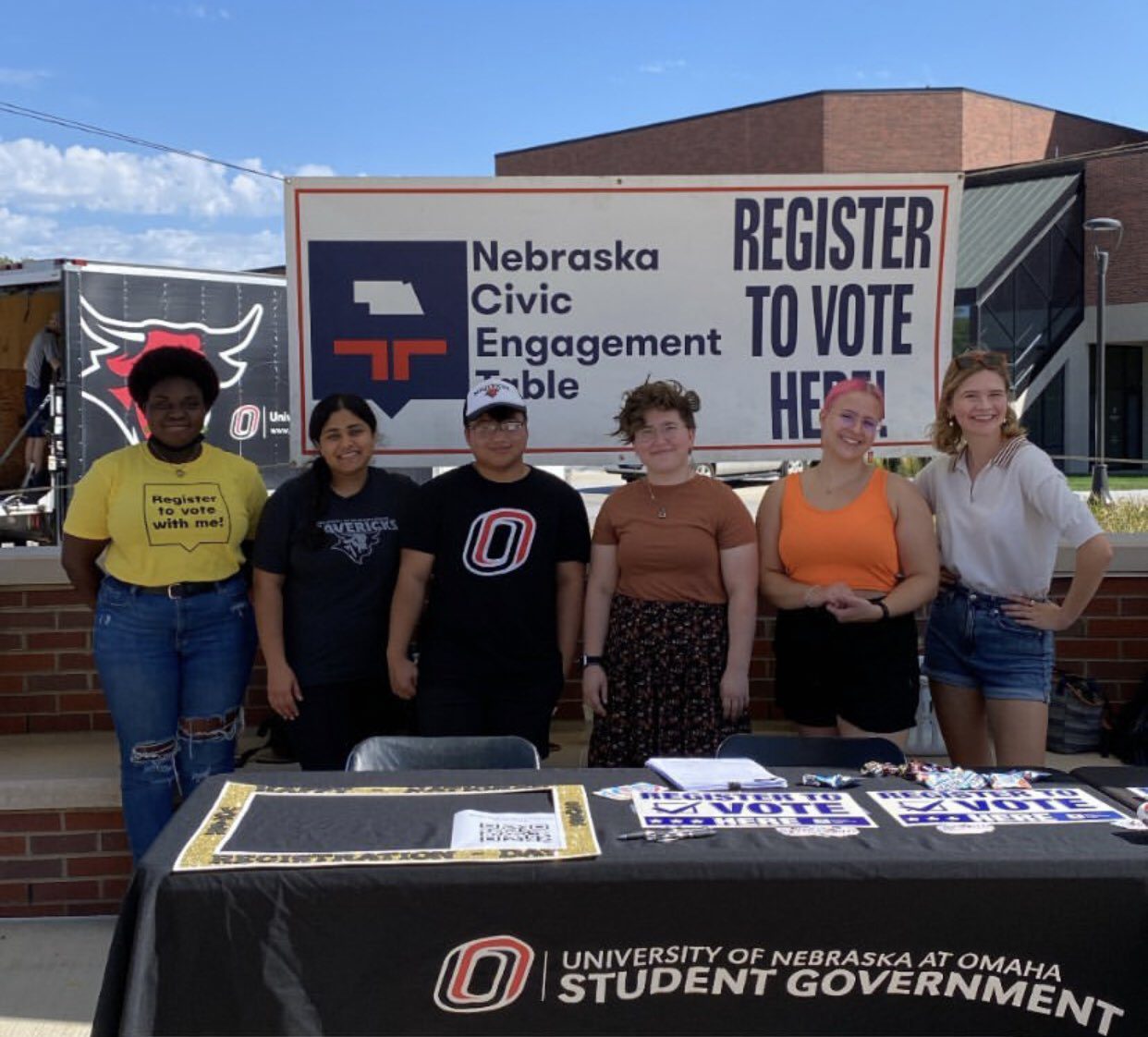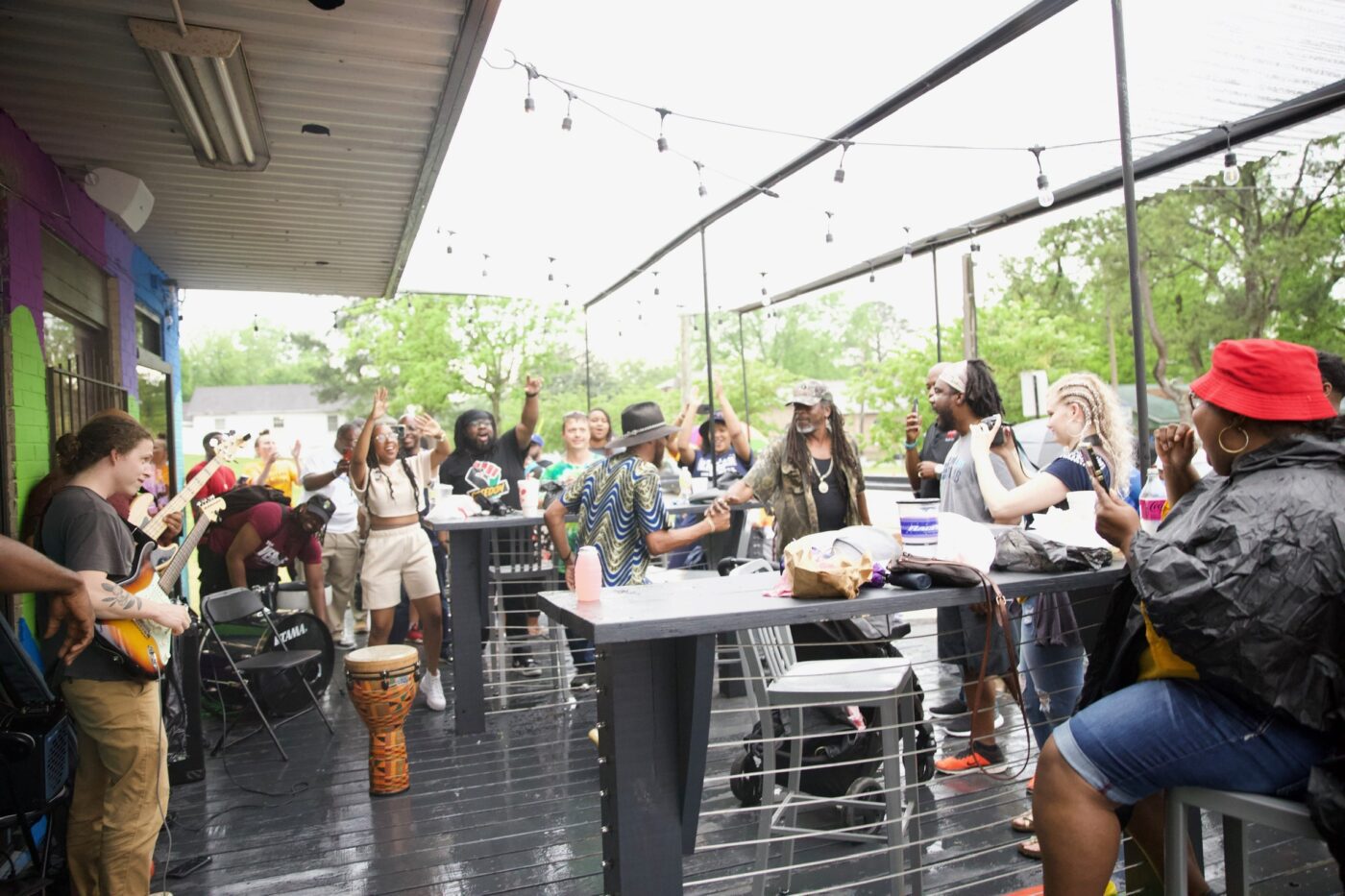State Voices’ Freedom Arts Collaborative is proud to present the Artist Interview Series. In this series, BIPOC artists provide personal perspectives and reflections on making their art and civic engagement an everyday practice. State Voices’ Freedom Arts Collaborative began in 2021, featuring a cohort of BIPOC artists’ work that envisions a BIPOC political power through their chosen medium.
In the first installment of the Freedom Arts Collaborative: Artist Interview Series, our host and State Voices Digital Storytelling Fellow, Linda Denson, speaks with DJ Lynnée Denise, an interdisciplinary artist, writer, and scholar, and explores the history of remixing, Denise’s coined term DJ scholarship, and the connection between Black music and everyday civic engagement. Together, DJ Lynnée Denise and Linda dissect the dynamic art of remixing as a tool for storytelling, history preservation, and political resistance and reimagine the ways in which everyday people can use the art of remixing as a tool in the fight for a healthy democracy.
Content warning for discussions of state violence, including slavery, suicide, and violence against LGBTQ+ communities.
Transcript:
LINDA DENSON: This is one of the interviews for the 2023 Freedom Arts Collaborative with State Voices. I’m Linda Denson, the digital storytelling fellow this year. And I’m here with DJ Lynnée Denise. A global practitioner of sound, language, and Black Atlantic thought, Lynnée Denise is an Amsterdam-based writer and interdisciplinary artist from Los Angeles, California. Shaped by her parent’s record collection and the 1980s, Denise’s work traces and foregrounds the intimacies of underground nightclub movements, music migration, and bass culture in the African Diaspora. She coined the term DJ Scholarship in 2013, which explores how knowledge is gathered, interpreted, and produced through a conceptual and theoretical framework, shifting the role of the DJ from a party purveyor to an archivist and cultural worker. A doctoral student in the Department of Visual Culture at the Goldsmiths University of London, Denise’s research contends with how iterations of sound system culture construct a living archive and refuge for a Black queer diaspora.
LYNNÉE DENISE: Ok, thank you, thank you for inviting me. I’m happy to be here and be in conversation with you. I am a DJ that was born in 1975 in Los Angeles, California. Which means I grew up in the 80s. Which, for me, has sort of lit a fire under my investment in telling the stories of what happened on queer dancefloors, on turntables where there were queer DJs, you know, making decisions about what the audiences, what the listeners, what the dancers would hear. And at the same time allowed the audience to shape what the DJs would play and select. So I’m very excited to think about this co-authorship that was happening in the 1980s.
This sort of co-listening practice allows us to hear from many of the people in the 1980s that are no longer here with us for various reasons under the sort of umbrella of Reganomics, which includes aids, the mass incarceration boom, the criminalization of crack addiction, and other forms of state violence, where Black queer folks were quite vulnerable. So those stories are important. I’m happy to be able here to share any of my thoughts and my workaround, you know, the Black 80s and just Black music in general and the role of DJs.
DENSON: Thank you so much. One of the things we’re exploring is art. Art in many different mediums is a form of embodied civic engagement. So one of the things I want to start off asking is, what does civic engagement mean to you?
DENISE: Yea, it’s interesting to think about..about the prefix “c-i-v” and the idea of a kind of civility and civil rights… and this kind of assumption that, you know, the sort of civil thing to do is to make sure that all civil beings have civil rights and human rights. So what I am clear about when I think about this embodiment of civic engagement is maybe the role that music played in the civil rights movement. Right, and that there is an actual soundtrack – and I’m saying the civil rights movement, but really Black people have used music to kind of ground and also score many if not all of our social movements. Because I am of the school of thought that Black music is indeed a form of social explanation and that we have used Black music to tell alternative stories. We have used Black music to mobilize music. We have used Black music to call out policies. We have used Black music in different ways to refuse. We have used Black music to heal. We have used Black music to teach. So I think civic engagement is a concept that is, to me, very intimately linked to Black music because Black music is so important, not just because it is political, which it is inherently just because of the Black experience in America and globally. But there is also a kind of knowledge production at work, a kind of sonic way of moving through what Cythina Hartman refers to as the afterlife of slavery.
DENSON: Wow, there’s so much there. But I want to talk about this term DJ scholarship. Like we said in the bio, you coined the term in 2013 can you tell us a little bit more about what it means to be a DJ scholar and what differences there are, if any, between being a DJ and a DJ scholar?
DENISE: Yea, you know DJ, the term was created as a way for me to create or as a way for me to think through a strategy for sort of amplifying and articulating the intellectual practices that are deeply embedded in the art form. And what I mean by that and what I was thinking through when I coined the term is figuring out, say, for example, how to get to the Black roots of Black electronic dance music, which is a misnomer, but I will just say Black dance music. And so I… what are the things I have to do to learn about these histories. Well, I have to sort of chance samples, perhaps, which is a cultural practice in dj scholarship. Which also leads to digging through crates, which is the second cultural practice in dj scholarship, and when I dig through those crates, I would be looking at album covers. And those album covers provide a visual history. And also helps me to develop a visual literacy of the visual story of Black music. And that those album covers have a long political history in terms of who’s on the album covers, whose not, whether or not dark-skinned women can be seen on the covers of dark-skinned people, you know what I mean…. Or even And also the beautiful ideology and cosmology that come through the visual album cover work like parliament and funkadelic which we have also used album cover as a way to kind of resist different forms of structural racism that shows up in the music industry. And then lastly, the fourth cultural practice, the third being sort of the album cover art analysis, is thinking about liner notes which are notes that typically accompany an album. Notes that oftentimes communicate to the reader or to the listener that you know who made the album, maybe the social conditions under which the album was made, who was on the bass, who they sampled, who wrote the song, who was the engineer? Maybe there was a poem. Maybe there’s a photograph that speaks to how the album was conceived. So those album notes became like a super resourceful or a massive resource for me to think about the literature around Black music, right? So then I had to ask questions like who writes liner notes typically? Is it us? Who is distributing that narrative? Is it us? Right… so this is overall, to be in DJ scholarship to me is the decision to invest in Black music beyond its entertainment value and to understand Black music as kind of a epistemological intervention, which is to say, a way of knowing and a way of sort of producing from that place of knowing and thinking about honoring different sorts of systems of building knowledge and respecting class-based — in fact, working class-based cultural production, which is what I consider at the foundation of DJ culture.
So you know the difference between a DJ and scholar, for me, is one who understands the urgent need to understand an alternative history presented through Black music. That there is a way, there is a way, to hear another story, and that other story is learned by an investigative research practice. Which I think is at the core of DJ culture in general. So whether you decide to be a DJ scholar who uses the music and listens to the music and reads about the music for the purpose of creating syllabi —which is what I do, or performance lectures — which is what I do, or writing — which is what I do, or you’re DJ scholar who’s like, I want to learn the history of jazz, and I have a radio show. And I want to play jazz, and in between songs, I want to break down the role that John Coltrane and Alice Coltrane played in the creation of free jazz in the 1950s. Right, there are different ways that scholarship is a part of the practice, and I’m just taking a super intentional route. And so luckily, cultural and educational institutions have been open to inviting me to share that practice as a thinker and as a scholar.
DENSON: Right, that is lovely. Sorry, I keep on nodding my head. I’m mmhmmming you know I’m real Southern I just have to vocalize when –
DENISE: I love it! First of all, I need people like you in the world. I need folks to be like mmm mmhmm, Cause you know when I’m doing this at, when I’m sharing the work at the universities, and all I hear is [silence].
DENSON: It’s so rigid. It’s absolutely so rigid. I love this idea of the performance lecture because, as an artist, my first thing was performance. I call dance my first language as my first medium as an artist. Kind of my first way of making people hear music the way that I do through performance. And so I’m wondering how you think through performance and just like how you got to this space of doing performance lecture and what you think about that as a pedagogy as well?
DENISE: Great word. Yea, you know what, thank you, and in fact, I respect and am indebted to dancers. Djs are indebted to dances. We don’t exist without y’all; it’s an interdependent relationship.
DENSON: I’m thinking about how when we were talking about co-authorship and how in many and really in all Black perfomanceship? The audience is so —it’s a communal and collaborative thing. And I think in a lot of white spaces, the university, the ballet art is something to be looked at. You know, in the opera, you look down at the performer, and there is this sort of inherent power structure and relationship between the audience and the —
DENISE: —Hierarchy
DENSON: Hierarchy, yeah, and I think a lot of Black art and Black performance is much more co-authored and much more collaborative, and the audience is a piece of the performance like a vital piece of the performance. This idea of bringing that form of coauthorship into what is normally a pretty hierarchical performance space in the university. I’m wondering about how you came to do that and what it’s like to lecture as a performer.
DENISE: Yea, and so I’m using the words performance and soulful interchangeably. I’m less of a performer and more so a soulful thinker, a soulful public scholar. And I – you talked about his sort of pedagogical angle, which is right because again when I think about the role of Black women teachers in America, who we are also indebted to, I think about, say, for example, bell hooks who has played a massive role in my life as a mentor a personal friend but also as someone who shaped me with her voice on the page.
But one of the things that stands out to me in terms of how our relationship began was I was invited to the University of Kentucky to share, you know, my sort of sonic reaction or my musical reaction to her bibliography, and I couldn’t believe that I had this opportunity because I had been reading bell hooks for years without the intention of presenting work on her and so here I was a DJ scholar prepared to make these important musical connections between her theories right and sound and region and place, her Southern roots, her Kentucky roots her approach to cultural studies, her shaping of Black feminist thought, her role as a popular cultural critic. And having all of those things come together under the guise of DJ scholarship was one thing. And playing music and songs that helped me understand her music and teaching those songs to the audience who were there to see me present was one thing. But the other thing was bell hooks walking into the room, and as I am presenting on her work, she comes in and sits in the front row right, and she just keeps, “Okay! Okay, girl! Your right,” she’s Southern now, and I’m sitting here like this is my Michael Jackson as far as I’m concerned. And what the heck can I do right, and then we we we had been friends ever since but one of the things she said to me was that this is the direction she wanted scholarship to move in.
Right, that she’s very critical of the role that, you know, even Black academics play in creating this false divide between the majority of us who are working class and this kind of ivory title sort of sometimes arrogance that sometimes maybe even looks like missionary work. I think that bell hooks encouraging me to continue that practice was a huge thing, and she affirmed me… it’s just like the highest honor. And it’s not just an honor because she’s a popular intellectual and she was this amazing feminist and all of those things, but because she was a serious advocate for critical pedagogy. That she was in conversation with Paulo Freire for those of you who are not familiar, you know, please look up the text Pedagogy of the Oppressed, and so my performance lectures are rooted in the principles of critical pedagogy and that it is at the core interactive because we’re talking about consciousness-raising among folks who are being exploited and the education is being used as a way to help them name, identify, resist, strategize against, right, the conditions that they find themselves under.
Now that in the university context obviously is very different, and so what I’m doing as a kind of subversive act is refusing to use that academic voice and that I am this sort of machine and this body, where like only my mind matters. Not my rhythm, not my timing, not my like ad-libs, you know, not my freestyle that those things don’t matter, which I feel like are things that are connected to years of Black soulful thought and in fact, the name of this project that I did for bell hooks is called Soulful Critical Thought right, and so because that listen to soulful critical thought! And that performance lecture, you know, a component of the work is a political, you know, action in fact given the emphasis placed on Western myths of, you know, objectivity.
DENSON: We talked about the 80s and this sort of gap in queer oral tradition because so many of us aren’t here and for reasons like that. And I think the current discourse around queer people trans people, especially there’s this political common sense almost that like everyone is supposed to accept that this is “new,” and so it’s really odd being from a place like New Orleans, a place where Black trans people and queer people have been at the forefront of our art making for so long. So the idea that this is a 2023 issue is very odd for me. And so I’m wondering about your thoughts on that sort of preservation and the sort of historiography you’re doing through DJ scholarship, specifically around the Black 80s and the Black queer 80s.
DENISE: Yea, historiography but also ontology, right, and thinking about the fact that my work is about ghost stories. And you know, and people are… people think about ghosts in ways, or have been conditioned to think about ghosts in ways that are unsettling, that are creepy, that are about horror. And when you think about there is this sort of horror story that sort of frames why people are not here right. But I think that, like yea those voices, I believe that I have been invited to speak by the ghosts, right, and I believe that in the tradition of, say Toni Morrison’s Beloved, Toni Morrison took it upon herself to speak right, for a woman and I can not remember her last name, but her first name is Margret right, and this woman who takes her the life of her child as an act of love and mercy to prevent that child from experiencing the institution of slavery right but it’s a ghost story, and for me, the ghost stories are about making sure to persevere the songs that folks were dancing to you know when they attended weekly parties and weekly funerals. Those ghost stories are about learning, you know about those listening practices that teach us about the complex personhood of these people, that they did more than died.
DENSON: —Yeah
DENISE: That these ghosts want to be remembered for more than their deaths, especially when you think about the conditions of those deaths, the carelessness of the state, the complete homophobic anti-Black, you know, class war curated by the Regan administration. Like we don’t want those ghosts to be solely remembered by those instances — not event instances but by the ongoing coloniality and captivity. We also wanna know what they danced to, we wanna know what they wrote, and we want to sit with what they wrote, and so what we’re talking about is maybe the differences between ghosts and relatives. It is now my responsibility to think through the document publicly and to make sure to articulate the actual intellectual and musical prowess at hand. Ok, I’m just going off now.
DENSON: No, ok, we need to hear it and I think that gets at one last of the questions that i wanted to get to on my list and that abolition in the popular discourse lately over the past three years in ways that I think are pretty uncomfortable for actual abolitionists. I think of abolition as actually not at all as destruction and actually as re-imagnination. I think about abolition as re-imagination. I think of art as the utmost re-imaginiatve tool, and I think a reason that I reached out to you initially is that the idea of the DJ as the “re-imaginator” like that is exactly the practice. And so I’m wondering in what ways or what things can the abolitionist, the activist, or even just the random voter on the street learn from the art of remix and how is the art of remix re-imagninative.
DENISE: Yea, that is great; first of all, that is a great metaphor, and to think about what it means to reimagine and think about the cultural practice of remixing as an example of that and the power of using that as a metaphor is so smart because it is about simply changing the original text the original story and creating something more imaginative or differently imagined than the original author right. That there are results only because, only because, the people experiencing this new way of living have an understanding of the old. You – in other words, the remix means almost nothing to folks or rather doesn’t mean as much, not nothing to someone who knows the original text. When you can listen to a song and like what you put drums right there, or you added an additional sample right, you get to engage with imagination, and in fact, the act of listening then becomes a kind of mutual imaginging. That you to have to remembered what the actual or original sounds like to appreciate this new way of, of you know presenting and performing this song, this older text.
And so politically and thinking about abolition and thinking about the work of Ruthy Gilmore, and Joy James, and Angela Davis and the work they’ve been doing for years to have us imagine other ways of resisting these like hyper-violent structural places are is critical. And so I just wanted to, you know, name these Black feminist thinkers that are part of why abolition as a word is being circulated right. And also thinking about scholars like Robin Kelley and Fred Moten and these ideas of ways that we can understand Black radical traditions in general, and abolition is one of those traditions, right? And you know what it is so important to think about a tradition that’s rooted in imagination, yea, and that is future-oriented and that is informed by the history. Do you want a song remixed by someone that’s never heard the original song? Like how do you, like what are you doing? Do you want the person remixing the song to really know the original, or do you just want to skim through it and go, “Yea, I get it, I get it” — no! You assume that they are going to sit with the original text, that they are going to look at the blueprint, that they are going to look at the original piece, that they are going to look at the original composition in order to make decisions that are imaginative that are conducive to you know that energy of that original text.
But I don’t want to make it seem like the original text being this sort of, thinking of sort of incarceration or the prison industrial context in general that is not necessarily what I mean by the original text. But I mean, in terms of abolition, maybe the original text is looking at how the prison industrial complex, in fact, doesn’t work. Looking at the harms, not looking at the model but looking at the models’ impact and finding other ways other social solutions of sort of addressing these issues. But I’m also an Afro-pessimist, and I’m not sure that I believe that’s possible, not that I don’t think that abolition and imagination is possible, I just —let me just say in my lifetime. In my lifetime, I’m not sure that this story can be remixed. Like James Baldwin said to describe why he votes is to slow down the machine, and I think that’s brilliant. He’s very clear, you know, and not fooled by this two-party system that has historically created harm for Black— in fact, harm is embedded in the political ideas of this two-party system. Right, but James Baldwin still says, and I vote. I vote to buy more time. And what does he do with that time? He produces text as a witness. He writes as a form of testifying so that there are other ways that, too is a part of abolition, right? That there are other ways and other paths and other routes and other channels to reach and to experience different forms of liberation. I don’t know if that answers the question, but yea.
DENSON: Yes, it does!
[Laughter]
DENSON: Thank you so much for being in conversation with us and for taking the time. Yea, I want to give you the opportunity to tell folks where they can find you, where they can appreciate your work, and where they can give you money if they can.
DENISE: Yea, and thank you! Thank you for the invitation. Our conversation was so lovely. Right, I have a book that’s coming out in September of this year (2023), and the book is called “Why Willie Mae Thornton Matters,” published by University of Texas Press. And it’s a book about a blues woman by the name of Willie Mae, more known as the Big Mama Thornton. For those of you who are not aware, she is the person who sang Hound Dog originally before Elvis and [who] ended up making millions of dollars for him and generations to come that bear his name while she died poor and buried in an unmarked grave. And so this story is, for me is a way to lift her up beyond the trauma. She was also an incredible artist, and I have the opportunity to lift her story up beyond this sort of place of injury that we all engage her from. So, Why Willie Mae Thorton Matters comes out in September, and you can pre-order it now on Amazon at Barnes & Noble or just Google why willie mae thornton matters by Lynnée Denise. You can also find me on Twitter and Instagram and look for DJ scholarship. I also have a website where you can also donate to this cultural scholarship. Thank you!
